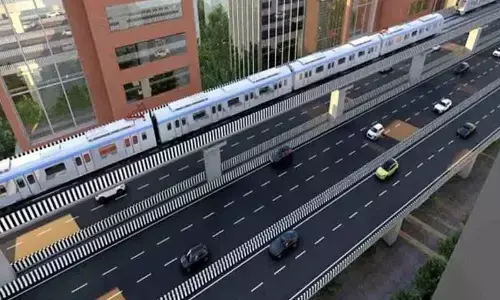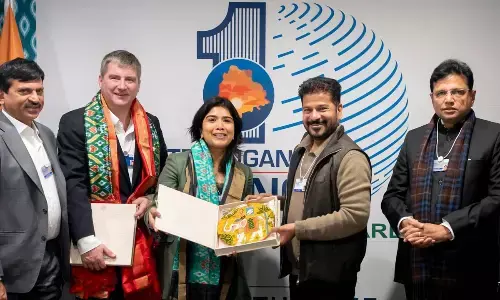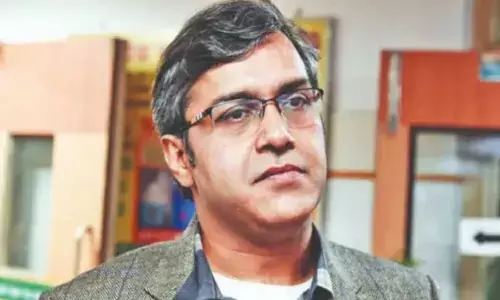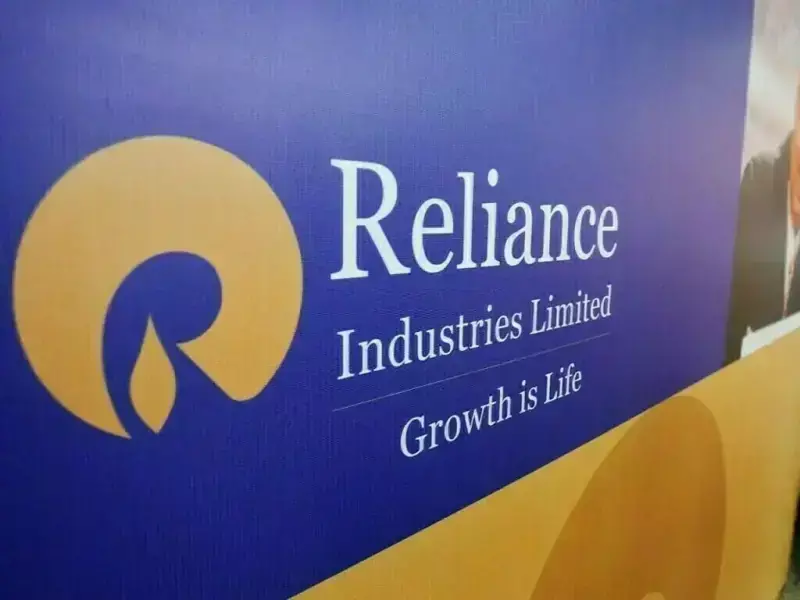God never intended to obstruct path for public
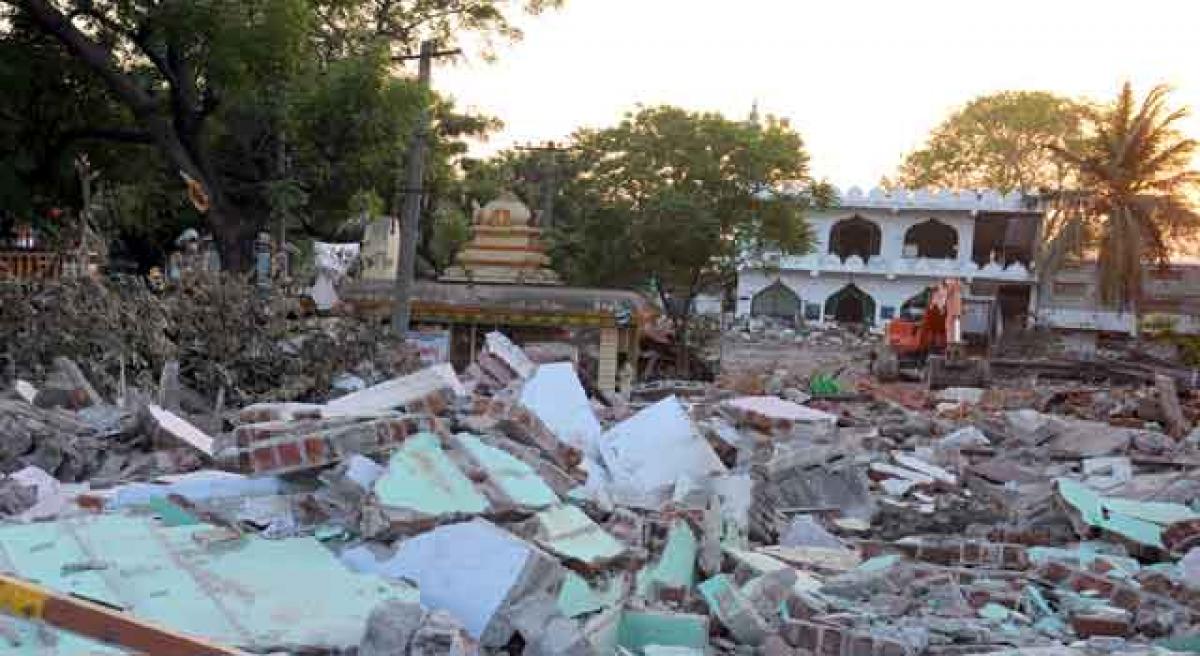
India despite being a secular democracy, anything and everything that has a relation to religion is sensitive and politically explosive. The religious orthodoxy challenges democratic governance. At times, the governance is oblivious to religious sentiments. Secular State does not mean irreligious. But, can we challenge the progress of civilisation in the name of religion, customs, traditions, beli
India despite being a secular democracy, anything and everything that has a relation to religion is sensitive and politically explosive. The religious orthodoxy challenges democratic governance. At times, the governance is oblivious to religious sentiments. Secular State does not mean irreligious. But, can we challenge the progress of civilisation in the name of religion, customs, traditions, beliefs etc.
Such questions often surface in our public discourse. The political slugfest between the TDP and the BJP, partners in the government, over the relocation of places of worship should also be seen in the overall context of the sensitive relationship between the temple or the mosque on one side and public utilities like roads on the other side.
The role of governance is clearly established in Indian jurisprudence as far as this question is concerned. The issue is therefore not the debate over the legality but the question of abiding by the rule of law. Without going into the merits of the arguments put forth by different conflicting parties in this, this article aims at focusing on the legal position so that citizens can make an informed opinion on this otherwise sensitive subject.
The Supreme Court in 2013 said, "Public road is not anyone’s property. Each citizen had a right to use the road and that right cannot be interfered with or impeded by constructing a temple, mosque, church or gurudwara or by installing the statue of a public figure."
However, the apex court itself has ordered the removal of these unauthorised religious structures without creating a law and order problem. This involves a lot of perseverance on the part of the civic authorities. The local people, political parties,
civil society groups should be taken into confidence before embarking on law enforcement though the authorities are legally empowered to do so as per the apex court order. Such enforcement of law can be done with due regard for the religious sentiments of ordinary citizens
The Supreme Court said that unauthorised religious structures near drains and on roads were an insult to God. “Everyone has the right to walk. God never intended to obstruct the path meant for the people. Why shouldn’t these structures go?” said a bench of Justices Gopal Gowda and Arun Misra, hearing a petition on the matter. The apex court had in September 2009 ruled no unauthorised construction shall be permitted in the name of temple, church, mosque or gurdwara on public streets, public parks or places.
Despite a clear ban on encroaching roads or other public places in the name of religion, the civic authorities often find it extremely difficult to remove any such encroachments due to competitive political mobilisation in the name of God. But, such acts of inconveniencing people are neither a divine activity nor have a divine sanction.
Sinister politics are behind such acts. But, local religious sentiments and their possible political fallout incapacitate the public authorities to enforce the law of the land despite clear instructions form the highest judicial institution of the country. Rule of law cannot be held hostage to the faith in a democracy.
The Supreme Court in 2013 in a final order on a petition filed by K R Pradeep Kumar said, "Public road is not anyone’s property. Each citizen had a right to use the road and that right cannot be interfered with or impeded by constructing a temple, mosque, church or gurudwara or by installing the statue of a public figure."
However, the apex court itself has ordered the removal of these unauthorised religious structures without creating a law and order problem. This involves a lot of perseverance on the part of the civic authorities. The local people, political parties, civil society groups should be taken into confidence before embarking on law enforcement though the authorities are legally empowered to do so as per the apex court order.
Such enforcement of law can be done with due regard for the religious sentiments of ordinary citizens. The procedures prescribed in the religion should be religiously adhered to while relocating the religious structures. Otherwise, the enforcement of law would be the fodder for the fissiparous forces to instigate trouble.
In a secular State, the government should not only be irreligious but even be neutral to all religions. Such acts of law enforcement through removal of unauthorised religious structures should be uniformly applied to all religions without any discrimination whatsoever for the sake of political appeasement. Any partisan stand of the authorities would flare up competitive communal polarisation much to the detriment of the society.
Religion alone is not the public concern. Even the public utilities are also of immense value for the people. The faith and the concerns of the people should be reconciled. When there is an unavoidable conflict between the two, the law upholds the public interest.
The apex court in its 2013 order said, “…Time has come when the public interest has to be paramount... Each and every citizen has a right to the public place that cannot be taken away by any person. Such practice must be discontinued.”
The apex court order applies not just to the religious structure; it also said the same thing for the erection of statues. In this regard, the court has rightly observed, “If you want to highlight the achievements of these leaders, you can do it without obstructing public roads.”
This applies to religion too. The trueness and the sacredness of religion can be propagated and practised without obstructing public spaces. Quite often, these unauthorised religious structures come up on roads and other public places in a small way.
The intransigence of authorities is exploited by the vested interests to expand their illegal construction. The civic authorities should ensure that places of worship which had been erected here and there on public land do not involve themselves in expansion, addition or alteration in any manner. Such timely enforcement of law would not allow the issue to snowball into a crisis as the religious structure acquires community patronage.
The Patna High Court in Rajendra Singh vs The State Of Bihar & Ors, 2013 has remarked, "......... Illegal erection of such places of worship is sought to be justified on the ground that citizens have a right to erect such places of worship at any place because of the freedom enjoyed under the Constitution. This is a misconception, and while every citizen has freedom to practice his own religion or faith, he has no right to erect structures in the name of religion in an unauthorised manner on public land and public road.”
In fact, those who encroach upon public spaces to erect religious structure are not doing so out of any love for their religion. As the Patna High Court itself observed, “…it is only a garb to encroach upon public land by unscrupulous persons who grab the lands in the name of God.
Apart from grabbing the lands for their own residence, encroachment is also beneficial in the sense that it provides them a source of income…” The Constitution of India respects religion but not its exploitation for self-aggrandizement of any kind.
The government should formulate a comprehensive policy and to identify all unauthorised structures. The State should spell out within what period it would demolish/relocate/regularise the structures. This would prevent the flaring up of such issues time and again, damaging the peace and tranquility in the society.








